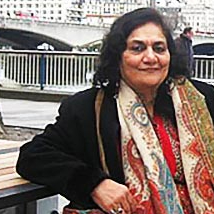Madeeha Gauhar facts for kids
Quick facts for kids
Madeeha Gauhar
|
|
|---|---|
 |
|
| Born | 21 September 1956 |
| Died | 25 April 2018 (aged 61) |
| Occupation |
|
| Years active | 1973 – 2018 |
| Spouse(s) | Shahid Nadeem (husband) |
| Relatives | Faryal Gohar (sister) Sarang Nadeem (son) Nirvaan Nadeem (son) |
| Awards | See list in this article |
Madeeha Gauhar (Urdu: مدیحہ گوہر; born September 21, 1956 – died April 25, 2018) was a famous Pakistani TV and stage actress. She was also a writer and director of plays that focused on social issues. Madeeha was a strong supporter of women's rights. In 1984, she started Ajoka Theatre, a group that performed plays about important social topics. They performed in theaters, on the street, and in public places. Through Ajoka Theatre, she performed in many countries in Asia and Europe. She was a leading actress on Pakistani television from the 1970s to the 1990s.
Contents
Madeeha Gauhar's Early Life and Career
Madeeha Gauhar was born in 1956 in Karachi, Pakistan. She studied English literature at Government College Lahore. After that, she moved to England. There, she earned another master's degree in theater science from the University of London.
Returning Home and Making a Difference
In 1983, Madeeha finished her studies and came back to Pakistan. She settled in Lahore. She quickly became involved in important social movements. On February 12, 1983, she joined the Women's March. This was a protest against the government at the time. She was even photographed being pushed by a police officer during the protest.
Founding Ajoka Theatre
In 1984, Madeeha Gauhar and her husband, Shahid Nadeem, started Ajoka Theatre. Ajoka means "Current" in English. This theater group became very important in Lahore. Ajoka Theatre used traditional Pakistani storytelling styles like Bhand and Nautanki. They mixed these old styles with modern ideas.
Theatre for Social Change
Madeeha Gauhar wanted her plays to connect with Pakistani culture. She didn't just use Western theater methods. She wanted to show real Pakistani feelings and issues. With Ajoka, she performed across Pakistan and in many other countries. They performed in places like India, Bangladesh, Nepal, and Sri Lanka. They also performed in several countries in Europe.
The main goal of Ajoka's plays was to promote a fair and equal society. Madeeha believed in a society where everyone is treated with kindness and respect. She directed about 36 plays. These plays were performed in Pakistan and other Asian countries. Madeeha used theater to show the social and political realities of Pakistan. As a feminist, she often focused on women's rights. She highlighted the challenges women faced in a society mostly led by men.
Awards for Her Work
Madeeha Gauhar received special honors for her theater work. In 2006, she won a Prince Claus Award from the Netherlands. In 2007, she received the International Theatre Pasta Award.
The Burqavaganza Play
In 2007, Ajoka performed a play called Burqavaganza. Madeeha Gauhar wrote and directed this play. It caused a lot of discussion and some controversy. Actors wore burqas and acted out scenes about unfair treatment, intolerance, and extreme ideas.
The play showed how some people might act one way but believe another. In Pakistan, some politicians wanted to ban the play. The Minister of Culture even threatened to stop the performances. The play was eventually banned. However, groups that support women's rights had the play translated into English. They performed it internationally to show their support for Ajoka Theatre.
Important Plays Directed by Madeeha Gauhar
Here are some of the major plays Madeeha Gauhar directed:
- Toba Tek Singh (based on a short story by Saadat Hasan Manto)
- Ek Thi Nani
- Bulha (about the life of Bulleh Shah)
- Letters to Uncle Sam
- Hotel Mohenjodaro
- Lo Phir Basant Ayee
Madeeha Gauhar's Death and Legacy
Madeeha Gauhar passed away in Lahore, Pakistan, on April 25, 2018. She was 61 years old and had been ill with cancer for three years. Madeeha Gauhar worked hard to promote peace between India and Pakistan. She was also known as one of Pakistan's leading activists for women's rights. The plays by Madeeha Gauhar's Ajoka Theatre often focused on social and human rights issues. For example, they addressed topics like education for girls, honour killings, and religious extremism.
Madeeha Gauhar's Television Work
Madeeha Gauhar also acted in several television series:
| Year | Title | Role | Network |
|---|---|---|---|
| 1982 | Dhoop Dewar | Nargis | PTV |
| 1982 | Alif Noon | Police lady | PTV |
| 1984 | Sohni Mahiwal | Sohni | PTV |
| 1985 | Apnay Log | Rehana | PTV |
| 1985 | Ali Baba Aor Qasim Bhai | Aliya | PTV |
| 1989 | Neelay Hath | Nabeela Noman | PTV |
| 1993 | Zard Dopehar | Saira | PTV |
| 1994 | Alao | Irshad | PTV |
| 1995 | Uraan | Rehana | PTV |
| 1995 | Nashaib | Naseem | PTV |
| 1997 | Janjal Pura | Politician | PTV |
Awards and Nominations
Madeeha Gauhar received many awards for her theater work:
- In 2005, she was nominated for Best Actress Drama Serial in a Supporting Role at the 1st Indus Drama Awards.
- Madeeha Gauhar was nominated for the Nobel Peace Prize in 2005.
- In 2006, Gauhar was given the Prince Claus Award in the Netherlands.
- She received the Tamgha-i-Imtiaz (Medal of Distinction) from the President of Pakistan in 2003. This was for her efforts to improve Pakistani theater.
- She also received the Fatima Jinnah Award from the Government of Pakistan in 2014.
See also
- National Women's Day (Pakistan)

